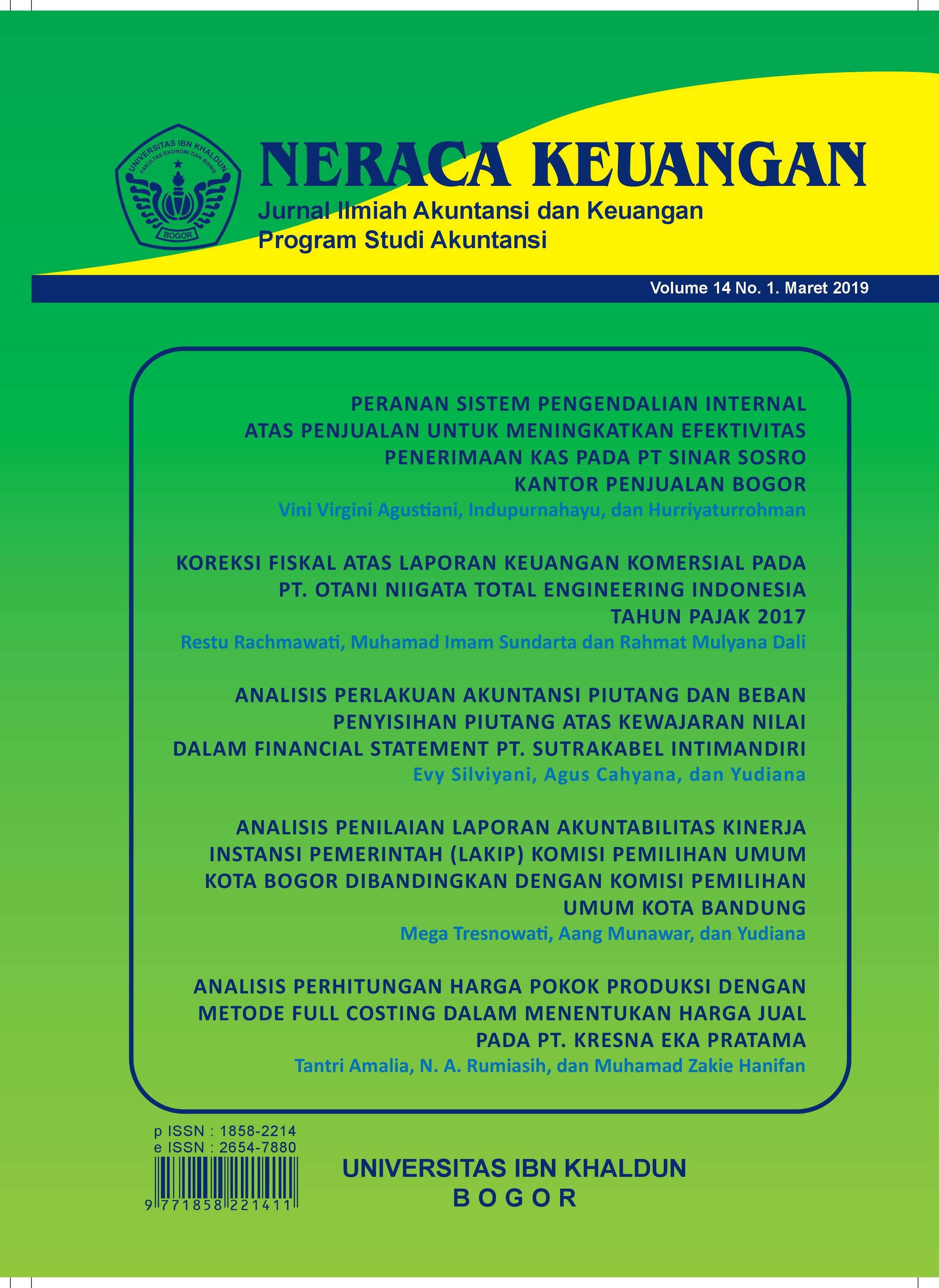EVALUASI KESUKSESAN PENERAPAN SISTEM e-SPT DENGAN MODIFIKASI MODEL WANG DAN LIAO
DOI:
https://doi.org/10.32832/neraca.v14i1.2400Abstract
Penelitian ini bertujuan menguji secara empiris mengenai evaluasi kesuksesan penerapan e-SPT dengan menggunakan modifikasi model Wang dan Liao (2008). Populasi yang digunakan dalam penelitian ini adalah wajib pajak yang telah menggunakan e-SPT dan merupakan peserta Brevet Pajak A&B Universitas Indonesia, dengan metode purposive sampling diperoleh 117 kuesioner yang memenuhi kriteria sampel. Hasilnya menunjukkan bahwa kualitas sistem e-SPT berpengaruh positif terhadap kepuasan pengguna dan penggunaan sistem e-SPT. Sehingga, semakin tinggi kualitas sistem e-SPT, maka pengguna akan semakin puas dan akan menggunakan sistem tersebut. Selain itu, kualitas layanan e-SPT berpengaruh positif terhadap kepuasan pengguna. Penggunaan sistem e-SPT juga berpengaruh positif terhadap manfaat bersih. Hal ini berarti bahwa, semakin baik kualitas layanan yang diberikan, maka pengguna akan semakin puas dalam menggunakan sistem e-SPT yang pada akhirnya dapat memberikan manfaat bagi pengguna
Kata kunci: Evaluasi Sistem, Kualitas Sistem, Kualitas Layanan, Kepuasan Pengguna, dan e-SPT
References
Alter, S. (2000). The Siamese Twin Problem: A Central Issue Ignored by Dimensions of Information System Effectiveness, Communication of The Association for Information System Research, Vol. 2, Article 20.
Chin, W. W., & Todd, P. A. (1995). On the Use, Usefulness, and Ease of Use of Structural Equation Modeling in MIS Research: A Note of Caution. MIS Quarterly, ABI/INFORM Global, 237.
Chiu, C. M., Chiu, C. S., & Chang, H. C. (2007). Examining The Integrated Influence of Fairness and Quality On Learners Satisfaction and Web-based Learning Continuance Intention. Information System Journal, Vol. 17, 271-287.
DeLone, W. H., & McLean, E.R. (1992). Information System Success: The Quest for the Dependent Variable. Information System Research, Vol.3, 60-95.
DeLone, W.H., & McLean, E.R. (2003). The DeLone and McLean Model of Information Systems Success: A Ten-Year Update. Journal of Management Information Systems, Vol.19, 9-30.
Doll, J. W., & Torkzadeh, G. (1988). The Measurement of End-User Computing Satisfaction. MIS Quarterly, Vol. 12, 259274.
Halawi, L. A., McCarty, R. V., & Arison, J. E. (2007). An Empirical Investigation of Knowledge Management Systems Success. The journal of Computer Information Systems, Vol. 58, 121-135.
Handayani, R. (2007). Analisis Faktor-Faktor yang Mempengaruhi Minat Pemanfaatan Sistem Informasi dan Penggunaan Sistem Informasi. Jurnal Akuntansi dan Keuangan Puslit Petra, Vol. 9, 2.
Igbaria, M., & Tan, M. (1997). The Consequence of Information Technology Acceptance On Subsequent Individual Performance. Information and Management 32, 113-121.
Iranto, B. D. (2012). Pengaruh Kepuasan Pengguna Sistem Informasi Terhadap Kinerja Individu: Studi Pada PT PLN Jawa Tengah dan DIY. Semarang.
Ita Salsalina, L. (2013). Pengaruh Penerapan e-SPT Terhadap Kepatuhan Pajak. Jurnal Akuntansi 5 (1), 50-60. ISSN 2085-8698.
Jogiyanto, H.M. (2007). Model Kesuksesan Sistem Teknologi Informasi. Yogyakarta: Penerbit Andi.
Kositanurit, B., Ngwenyama, O., & Osei-Bryson, K. (2006). An Exploration of Factors that Impact Individual Performance in An ERP Environment: An Analysis Using Multiple Analytical Techniques. European Journal of Information Systems 15 (6), 556-568.
Myers, B. L., Kappelman, L. A., & Prybutok, V. R. (1997). A Comprehensive Model for Assessing the Quality and Productivity of the Information Systems Function: Toward A Theory for Information Systems Assessment. Information Resources Management Journal 10 (1), 6-25.
Parasuraman, A. B., & Zeithaml, V. A. (1985). A Conceptual Model of Service Quality and Implication for Future Research. Journal of Marketing, Vol. 49, 41-50.
Petter, S., McClean, E., & DeLone. (2008). Measuring Information Systems Success: Model, Dimension, Measures, and Interrelationships. European Journal of Information Systems, Vol.17.
Pitt, L. F., Watson, R. T., & Kavan, C. B. (1995). Service Quality: A Measure of Information Systems Effectiveness. Management Information Systems (MIS) Quarterly 19 (2), 173-188.
Purwaningsih, S. (2010). Analisis Kesuksesan Penerapan Sistem Informasi pada Sistem Informasi Pelayanan Terpadu (SIPT) Online (Studi Pada PT Jamsostek). Semarang: Sekolah Tinggi Ilmu Ekonomi Widya Manggala.
Radityo, D., & Zulaikha. (2007). Pengujian Model DeLone dan McClean Dalam Pengembangan Sistem Informasi Manajemen. Simposium Nasional Akuntansi X. Makassar.
Rai, A., Lang, S. S., & Welker, R. B. (2002). Assessing The Validity of IS Success Model: An Empirical Test of and Theoretical Analysis. Information System Research, Vol. 13, 50-69.
Seddon, P. B. (1997). A Respesification and Extension of the DeLone and McClean’s Model of IS Success. Information System Research, Vol. 8, 43.
Sekaran, U. (2003). Research Method for Business 4th ed. New York: John Willey and Sond.
Shaw, N. C., DeLone, W. H., & Niederman, F. (2002). Source of Dissatisfaction in End-User Support: An Empirical Study. The Database for Advances in Information Systems, 33 (22), 41-56.
Shirani, A., Aiken, M., & Reithel, B. A. (1994). Model of User Information Satisfaction, Data Base, 25 (4), 17-23.
Tanya, H. P., McGill, & Klobas, J. (2003). User-Developed Aplications and Information Systems Success. Information Resource Management Journal.
Van Dyke, T. P., Kappleman, L. A., & Prybutok, V. R. (1997). Measuring Information Systems Service Quality: Concern on the Use of the SERVQUAL Questionnaire. MIS Quarterly, 21 (2), 195-208.
Wahyuni, T. (2011). Uji Empiris DeLone dan McClean terhadap Kesuksesan Sistem Informasi Manajemen Daerah (SIMDA). Jurnal BPPK, Vol.2.
Wang, Yi-Sun., & Liao, Yi-Wen. (2008). Assessing E-Government Systems Success: A Validation of the DeLone and McClean Model of Information Systems Success. Government Information Quarterly 25 (4), 717-733.
Watson, Pitt, L. F., & Richard, T. (1998). Measuring Information Systems Services Quality: Concern for A Complete Canvas. MIS Quarterly, 21 (2), 209-222.
Widowati, E., & Achjari, D. (2004). Pengukuran Konsep Efektivitas Sistem Informasi: Penelitian Pendahuluan. Seminar Nasional Aplikasi Teknologi Informasi. Yogyakarta: SNATI.
Wijanto, Setyo H. (2015). Metode Penelitian menggunakan Structrural Equation Modeling dengan Lisrel 9. Lembaga Penerbit Fakultas Ekonomi Universitas Indonesia: Jakarta.
Wiyono, A. S. (2009). Evaluasi Kesuksesan Sistem Informasi Manajemen Kejaksaan Republik Indonesia 2 (SIMKARI-2) pada Wilayah Kejaksaan Tinggi Daerah Khusus Ibukota Jakarta. Tesis.
Wu, J. H., & Wang, Y. M. (2006). Measuring KMS Success: A Respecification of The DeLone and McClean Model. Information and Management, 728-739.














